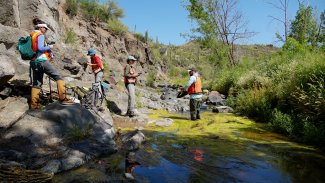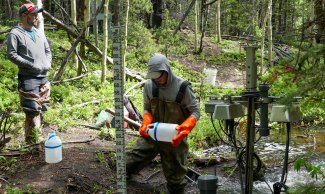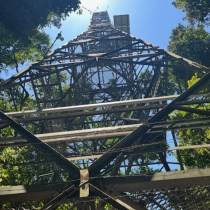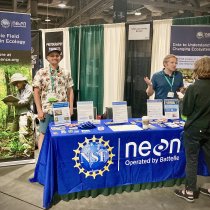AccelNet Award Enables Global Drought Research
January 3, 2024
Drought is not just a regional issue – it is a global issue. A recent $1.6M award from the National Science Foundation (NSF) through the AccelNet Program will support efforts to harmonize international, drought-related ecological data across several networks in different countries. This "network of networks" approach will enable researchers to study the drivers and impacts of drought on a global scale and cultivate a sustainable international data platform and partnership, capitalizing on already-established trust and cultural understanding fostered among six large-scale ecology networks.
The three-year AccelNet grant was awarded in September 2023 to Battelle, the nonprofit organization that manages the National Ecological Observatory Network (NEON) program. Mike SanClements, Research Initiatives Lead at NEON, is the principal investigator for the grant. The NEON program will act as the lead for this project and coordination across the international ecology infrastructures that form the Global Ecosystem Research Infrastructure (GERI) network.
While the initial focus will be on drought, this effort will open up opportunities for broader collaborative research on various environmental challenges. This award also places priority on training a diverse, globally-competitive STEM workforce in the data science and communication skills required to work across networks and cultures through a funded workshop series, inclusion in GERI working groups, and an international scholar exchange.
A "Network of Networks" Approach to Ecological Research
Battelle's AccelNet proposal grew out of the 2019 initiative that formed the GERI with a first-of-its-kind agreement among six continental-scale ecological observatories around the world. A goal of the GERI is to enable collaboration and data interoperability between member networks in North America, Europe, Africa, Asia, and Australia. In addition to NEON, participating networks include the European Long-Term Ecosystem Critical Zone and Socio-Ecological Research (eLTER), the Integrated Carbon Observing System (ICOS) in Europe, the South African Environmental Observation Network (SAEON), the Chinese Ecosystem Research Network (CERN); and the Australian Terrestrial Ecosystem Research Network (TERN) research infrastructures.
Christine Laney, a NEON Data Scientist specializing in ecoinformatics, is a co-principal investigator for the AccelNet grant. She says, "The data we collect at NEON are important not only to understand ecosystem processes in the U.S. but can also help researchers investigate global processes. Harmonizing data and building collaborative relationships across international networks enables NEON to have a global impact and gain resource efficiency beyond that of its original design."

NEON staff doing Water Chemistry sampling and processing at the SYCA aquatic site in D14.
The goal of the NSF AccelNet Program is to accelerate scientific research by building "networks of networks." This approach will allow the scientific community to tackle questions and problems that require extensive international cooperation in research planning and data sharing. To see the potential benefits of a network-of-networks approach, participating networks must first work through several barriers, ranging from data interoperability to navigating different cultural and communication approaches.
Under the AccelNet award, NEON and the GERI will seek to address these challenges by:
- Harmonizing data across GERI members using FAIR data principles and creating a federated web service that will draw data from all participating networks.
- Using culturally sensitive communication and governance protocols to support broad engagement and participation across networks.
- Creating opportunities for workforce development focused on early-career scientists, including open workshops focused on the technical, cultural, and communication skills needed to facilitate successful international collaboration across networks.
The grant will also support funding and mentoring for two post-doctoral fellows who will lead the technical aspects of data harmonization.
Investigating Global Drought
The Battelle AccelNet award focuses specifically on drought as the first area of focus for the GERI initiative. Laney says, "Drought is becoming an urgent issue globally, for both humans and ecosystems. Drought impacts the ecosystem services and resources that are available to us, from food production to freshwater access to the carbon capture potential of ecosystems."
Over the last few decades, a growing number of regions have experienced periods of ecological drought, leading to large-scale changes in ecosystems. Some of these impacts include reduced plant growth or increased plant die-offs, reduction or extinction of local species, disruptions to local hydrology and freshwater ecosystems, and an increased risk of wildfires and other disruptive events. For humans, drought means loss of crops and resulting food insecurity, loss of access to local freshwater sources, and loss of property to fire.
The AccelNet project provides a unique opportunity to look at these issues and shifting drought patterns on a global scale. The ultimate goal is to allow researchers to explore grand-challenge questions such as how drought-induced changes in water availability impact ecosystem response and feedback loops; how vulnerable those ecosystems are; and if some ecosystems are nearing a tipping point that could permanently transform them into a different state.
"Some of these large research infrastructures have been collecting monitoring data over long periods of time over large regions," says Laney. "Bringing these data sets together for comparison and analysis will enable the science community to look at the processes governing drought not just regionally, but globally."

D13 NEON staff conducting water jug sampling at the COMO field site.
The success of the initiative will depend not only on data systems but on the people driving the collaboration. SanClements explains, "This can only be done with the recognition that people are foundational to any collaboration or network of networks. This project will allow us to strengthen and expand our international relationships, bring more early career researchers to the table, and engage our stakeholder partners to provide key data products at the global scale."
Next Steps for the AccelNet Drought Project
Over the next three years, the NEON program and other GERI member networks will be working to develop harmonized data systems and foster opportunities for collaboration, training, and development. The drought project will also bring together other collaborators including the International Drought Experiment (Drought-Net) at Colorado State University and the Sullivan Lab at Oregon State University. There are also budding partnerships with similar organizations in Mexico and Latin America.
The focus on ecological drought is an important proof of concept for the GERI and the network-of-networks approach. In the future, this approach could be applied to a variety of other ecological questions and use cases, such as global biodiversity, carbon cycling, and plant productivity.
Laney says, "By combining our efforts across networks, we can help people ask and answer novel scientific questions that aren't possible when looking at data at a local or regional scale. The more we can make our networks' data accessible and available, the more people will see how useful they are for answering global questions."


